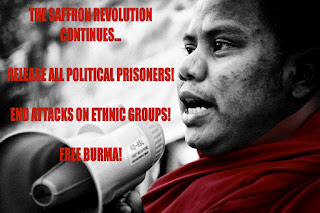September 20, 2007
The Victory of
Our Solemn Promise
There
was a shower in the morning; it became a heavy rain in the afternoon. On the
previous day, monks walked around streets with soaking wet robes in the rain
but they looked fresh, cheerful and active. I was delightful to see them and I
thought that it was because of Mitta, loving-kindness between monks and men.
I
heard a young monk said to an old one in the hall of the Bronze Image,
‘I think you’ve got a fever last
night because you’ve a long walk in the rain yesterday. I leave you at the monastery and come alone
so. How do you come here with your fever?’
‘It’s
just a slight fever. It’s a trifling for me!’ said the old one, putting his
thumb upwards.
I
was very proud of his manner and said ‘Well done!’ in my mind. If the old monk
looked sick, I would request him not to march for that day with us. He seemed
okay and I left him. We made our plan for the day, waiting other monks and had
lunch. At twelve o’ clock sharp in the afternoon. The column of demonstrators, which
I took part in was to march to the Kyikekasan Pagoda in Thingangun township,
the Eastern part of Yangon.
At
the Kyikekasan Pagoda, the Yangon military commander General Myint Swe and his
men were waiting to offer monks rice and provisions. That was the military
government’s plan to destroy our solemn promise not to accept any donation from
the military men until they comply with the monks’ demands.
Their
donation was aimed at making a strategic attack to our monks’ keeping Pattaneikkuzzana Vinaya; they had no wish to make good deeds nor pay respect to
monks. If monks had accepted the donations of those whom they all agreed to
oppose, the promise may naturally be broken down. At that moment, the military
men prepared to offer monks some rice with other provisions.
I
was afraid that if some of the monks accepted the donation, our whole keeping
of the promise would break down. My anger arose at first, but I made it cease
and with my hand speaker, I tried to explain the monks,
‘Oh,
respectable monks, we, all monks of Myanmar have been keeping the promise of Pattaneikkuzzana Vinaya. We, thus,
should avoid accepting their donation.’
All
the monks there did not accept the donation; in such manner was turning monks’
bowls upside down. Monks’ bowls is called thabeik
and turning upside down is hmauk
in Myanmar _ thabeik-hmauk or opposing to the oppressing government in
essence can be shown in public with the unity of all monks there. That tendency
never swayed among monks in all towns, regions and cities of Myanmar.
The
tactical approach of the military group to destroy our promise or to part the
monks’ unity failed there. I felt the spirit of union in monks. This was a
peaceful success over the government. This was the pleasure of union spirit for
me.
Also,
this was monks’ first proof to our life-long daily donors who were living under
the great dictatorship for about half a century, and the proven event of monks’
unity in opposing the government _ following the peaceful way of our Lord
Buddha. Also, this was our response of gratitude to our dayakar and dayikama, our
men and women donors who lived with the fear.
Forming a Group of Sundry Tasks
Several
invitations on the platforms and stairways of pagodas to accept their donations
to the monks occurred later; for the monks, they went back to their respective
monasteries without any acceptance of offerings as to support our demonstration
according to our Buddhist ethics. Everybody in the demonstration appreciated
them, saying ‘Well done!’ several times.
More
monks from far places came to our target place, the Bronze Image day by day to
join the demonstration. Some monks had to go to us secretly from their chief
monks of the monasteries. They were new comers to our demonstration, and
because they were monks, preparation of them to accommodate was necessary. We
discussed to form a group of sundry tasks_ a group of 15 men and women formed
with the approval of everyone there, about ten hundred students and people.
We,
monks, participated in the demonstration had a sense of being escorted spies
throughout. We could enter our
monasteries around nine o’ clock at night for our security.
My
chief monk called me to meet him. At that time, I was about to exchange my
dripping robe. I had to meet him.
The
chief monk said to me,
‘I’ve
seen your face, Htavara, in DVB (Democratic Voice of Burma) channel.’ I dared
not response him anything.
I
had no words to reply to my chief monk. I was existing; my respect towards to
my chief monk was extraordinary. I was sweating up to my toes! My chief monk
later said,
‘Be
careful, Htavara, why do you see them as humans? They are good-for-nothing!
Don’t deal with them. They are not deserved with you, or our Mitta.’
My
chief monk said to me such words. He turned around and entered into his room. I
was very glad to know that, I entered into my room. I had to discuss our
operation with my guests until two o’clock in the morning. I had a time to take
a rest, then. I laid down myself on bed, reminding the Mitta Sutta. Then I fell
into deep sleep.














0 comments:
Post a Comment